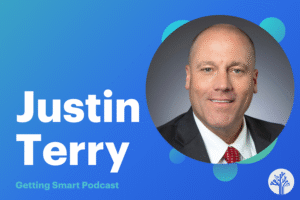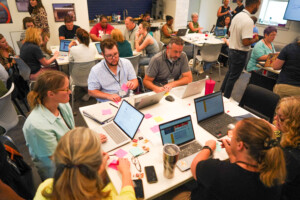Considering Competency-Based Education

The shift from time to learning, from cohorts to competency, will be tough. It’s not easy or superficial–it’s a new and different way of organizing schools. It will probably take us a generation to fully embrace high common expectation, blended formats, and show what you know policies and practices.
CompetencyWorks , an online community and resources supported by iNACOL, outlines five components of competency-based education (CBE):
- Students advance upon mastery.
- Competencies include explicit, measurable, transferable objectives that empower students.
- Assessment is meaningful and positive learning experience for students.
- Students receive timely, differentiated support based on their individual needs.
- Outcomes include application of knowledge and development of important skills and dispositions.
The definition sets a high bar for CBE by requiring well stated learning targets, powerful learning experiences, better reporting systems, and new rules for matriculation management.
Meeting Rose Colby was the highlight of my week. We both spoke at the Iowa ASCD (#IAcomped) meeting which was focused on competency-based learning. Rose is a former New Hampshire principal and is now the state’s go-to coach for all things competency related.
Rose kicked things off in Des Moines (notes here) with a short video from Nick Donohue, who was New Hampshire chief when they adopted CBE policies. Donohue, now CEO of Nellie Mae Education Foundation and a fellow iNACOL board member, asked us to think about “how to move to integrated student-centered year round models of education”
“We are the ones in love with our educational model,” said Donohue, “Our customers are in love with their children.” Nick said the “shift from student endurance to student competency” is not “about adding few minutes at the end of the day or adding a few more dollars to the system…this changes the foundation.”
To add to the challenge, Rose threw down the gauntlet, “We are in a perfect storm.” She was referring to the combination of economic and moral imperatives to achieve more while facing a graying teacher demographic and a challenging student demographic. “The financial imperative has crashed into the moral imperative. The storm is fierce.”
“Community college remediation math statistics tell us we have not done a good job ensuring students are mastering concepts,” said Colby. “We do a good job documenting their failures and giving them high school diplomas.”
Rose suggested that U.S. education is like the Postal Service, “Our system is in failure, we need to do something brand new.” She added, “The needs of the digital learner today are not regularly being met using teaching methodologies better suited to previous generations,” said Colby.
While individual teachers may be able to flip their classroom, Rose said competency-based progression “can’t be a single teacher solution” because it takes “a systemic approach.”
Rose said, “Traditional grading systems do not work in the any place any pace competency-based learning systems of today.” But she noted over a beverage that grades can be a controversial place to start (an idea not new to me having experienced a vote of no confidence over standards-based report cards in the 90s). She said it’s better to start with time for teachers to interact with standards, create powerful learning experiences, and give students opportunities for them to show what the know (like the Presentations of Learning we saw at an Expeditionary Learning school in NYC).
Inside the Beltway. Meanwhile, back in DC, Achieve has been hosting meetings on CBE. They’ve created a working group that includes 11 states from the American Diploma Project and 11 organizations including NGA, CCSSO, and iNACOL. In August they will publish policy guidance to states on assessments, accountability, and graduation requirements.
The shift from units of time to units of learning, and the shift from birthdays to demonstrations of learning as the key to matriculation a profound change–in many ways more challenging than the shift from print to digital. It will be difficult, but competency-based education it is key to dramatically increasing the percentage of students leaving school ready for college and careers.







0 Comments
Leave a Comment
Your email address will not be published. All fields are required.